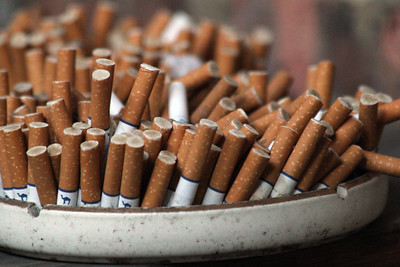Archive for April, 2022
Tell the truth, especially when it’s difficult.
 Our behavior is a result of causes and conditions. One thing paves the way for the next. Elements of the first thing create a preferential path for the next thing. If someone gets praised for doing A, more people will do A, even when A is the wrong behavior. If someone gets chastised for doing B, B won’t happen again, even when B is the right behavior.
Our behavior is a result of causes and conditions. One thing paves the way for the next. Elements of the first thing create a preferential path for the next thing. If someone gets praised for doing A, more people will do A, even when A is the wrong behavior. If someone gets chastised for doing B, B won’t happen again, even when B is the right behavior.
The most troubling set of causes and conditions are those that block people from telling their truth. When everyone knows it’s a bad idea, but no one is willing to say it out loud, that’s a big problem. In fact, it may be the biggest problem.
When people think they won’t be taken seriously, they keep their truth to themselves. When people know they will be dismissed, they keep quiet. When people feel the situation is hopeless because there’s no way they’ll be listened to, they say nothing.
When people see others not taken seriously, that creates conditions for future truths to be withheld. When people see others being dismissed, that creates conditions for future truths to be kept quiet. When people see others in others from not being listened to, that creates conditions for future truths to remain unsaid.
And causes and conditions are self-strengthening. The more causes and conditions are reinforced, the more the behaviors become ingrained. The more people are stifled, the more they will keep quiet. The more people are dismissed, the more they’ll shut up. The more people’s truths are ignored, the more they’ll remain unsaid.
Here are three rules for truth-telling that will help you and your company move forward:
- Without truth-telling, there can be no truth-telling.
- The longer truth-telling is stifled, the harder it is for truth-telling to reemerge.
- Truth-telling begets truth-telling.
Image credit — Jinterwas
Instead of rebranding, why not keep the brand and improve your offering?
 Cigarette companies rebranded themselves because their products caused cancer and they wanted to separate themselves from how their customers experienced their products. Their name and logo (which stand for their brand) were mapped to bad things (cancer) so they changed their name and logo. The bad things still happened, but the company was one step removed. There was always the option to stop causing cancer and to leave the name and logo as-is, but that would have required a real change, difficult change, a fundamental change. Instead of stopping the harm, cigarette companies ran away from their heritage and rebranded.
Cigarette companies rebranded themselves because their products caused cancer and they wanted to separate themselves from how their customers experienced their products. Their name and logo (which stand for their brand) were mapped to bad things (cancer) so they changed their name and logo. The bad things still happened, but the company was one step removed. There was always the option to stop causing cancer and to leave the name and logo as-is, but that would have required a real change, difficult change, a fundamental change. Instead of stopping the harm, cigarette companies ran away from their heritage and rebranded.
Facebook rebranded itself because its offering caused cancer of a different sort. And they, too, wanted to separate themselves from how their customers experienced their offering. The world mapped the Facebook brand to bullying, harming children, and misinformation that destroyed institutions. Sure, Facebook had the option to keep the name and logo and stop doing harm, but they chose to keep the harm and change the name and logo. Like the cigarette companies, they chose to keep the unskillful behavior and change their brand to try to sidestep their damaging ways. Yes, they could have changed their behavior and kept their logo, but they chose to change their logo and double down on their unhealthy heritage.
The cigarette companies and Facebook didn’t rebrand themselves to move toward something better, they rebranded to run away from the very thing they created, the very experience they delivered to their customers. In that way, they tried to distance themselves from their offering because their offering was harmful. And in that way, rebranding is most often about moving away from the experience that customers experience. And in that way, rebranding is hardly ever about moving toward something better.
One exception I can think of is a special type of rebranding that is a distillation of the brand, where the brand name gets shorter. Several made-up examples: Nike Shoes to Nike; MacDonalds Hamburgers to MacDonalds; and Netflix Streaming Services to Netflix. In all three cases, the offering hasn’t changed and customers still recognize the brand. Everyone still knows it’s all about cool footwear, a repeatable fast-food experience, and top-notch entertainment content. If anything, the connection with the heritage is concentrated and strengthened and the appeal is broader. If your rebranding makes the name longer or the message more nuanced, you get some credit for confusing your customers, but you don’t qualify for this special exception.
If you want to move toward something better, it’s likely better to keep the name and logo and change the offering to something better. Your brand has history and your customers have mapped the goodness you provide to your name and logo. Why not use that to your advantage? Why not build on what you’ve built and morph it slowly into something better? Why not keep the brand and improve the offering? Why not remap your good brand to an improved offering so that your brand improves slowly over time? Isn’t it more effective to use your brand recognition as the mechanism to attract attention to your improved offering?
In almost all cases, rebranding is a sign that something’s wrong. It’s expensive, it consumes a huge amount of company resources, and there’s little to no direct benefit to customers. When you feel the urge to rebrand, I strongly urge you to keep the brand and improve your offering. That way your customers will benefit and your brand will improve.
Image credit Quinn Dombrowski
An open letter to company leaders: We’re still out of gas.
We’re still out of gas.
Corporate initiatives and reinvention are important, but so are the fundamentals of meeting customer orders and keeping the production lines running. And so is our emotional well-being.
We cannot do it all.
Our youngest children must go to daycare and elementary school, and that scares us. And when they get the sniffles, we have a difficult time knowing whether it’s the sniffles or Covid. And that creates stress for us. Though we faithfully show up every day, our children’s health is a concern for us. We still give 100%, but it isn’t as good as a couple of years ago. But it is our best.
Our children in high school and college are having a difficult time. In-person, not in-person, masks, no mask, and soon-to-be masks are all additional stressors to the already stressful high school and college dynamics. This is what we live with every day. Is college even worth it? Our kids aren’t sure and neither are we. But that doesn’t stop the expenses. This is what we have to deal with after a full day of work. It’s stressful and draining. And our batteries aren’t fully charged when we wake up in the morning. Yet, we come to work and give our best. Though we know our best isn’t as good as it used to be, it IS our best.
We can’t give more.
And there’s a war in Europe. And while that messes up the company’s financials, it also messes up our emotional state. People are being killed every day and we see the pictures on the web. This drains and debilitates us. We need some time to process all this.
Partisan politics are sucking the positivity out of our country, and it drains all of us.
We have less to give.
And climate change is here, and it’s scary. And we don’t know what to do. We didn’t travel for business over the last years, and we did okay. Why not save the cost and the carbon like we did over the last two years?
Respectfully submitted,
Your People
image credit — Nathan
Did you make a difference today?
Did you engage today with someone that needed your time and attention, though they didn’t ask? You had a choice to float above it all or recognize that your time and attention were needed. And then you had a follow-on choice: to keep on truckin’ or engage. If you recognized they needed your help, what caused you to spend the energy needed to do that? And if you took the further step to engage, why did you do that? For both questions, I bet the answer is the same – because you care about them and you care about the work. And I bet they know that and I bet you made a difference.
Did you alter your schedule today because something important came up? What caused you to do that? Was it about the thing that came up or the person(s) impacted by the thing that came up? I bet it was the latter. And I bet you made a difference.
Did you spend a lot of energy at work today? If so, why did you do that? Was it because you care about the people you work with? Was it because you care about your customers? Was it because you care enough about yourself to live up to your best expectations? I bet it was all those reasons. And I bet you made a difference.
Image credit — Dr. Matthias Ripp


 Mike Shipulski
Mike Shipulski